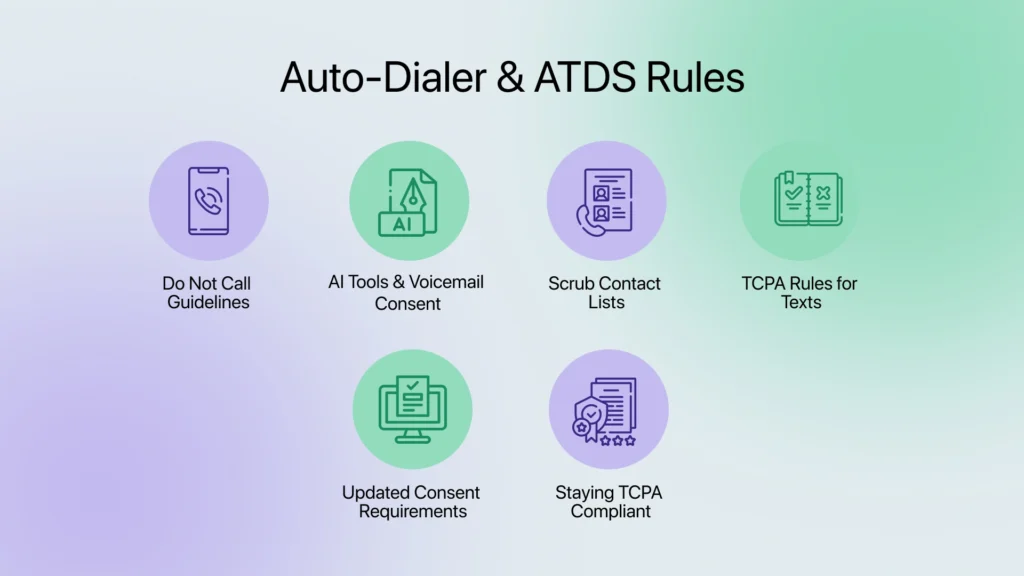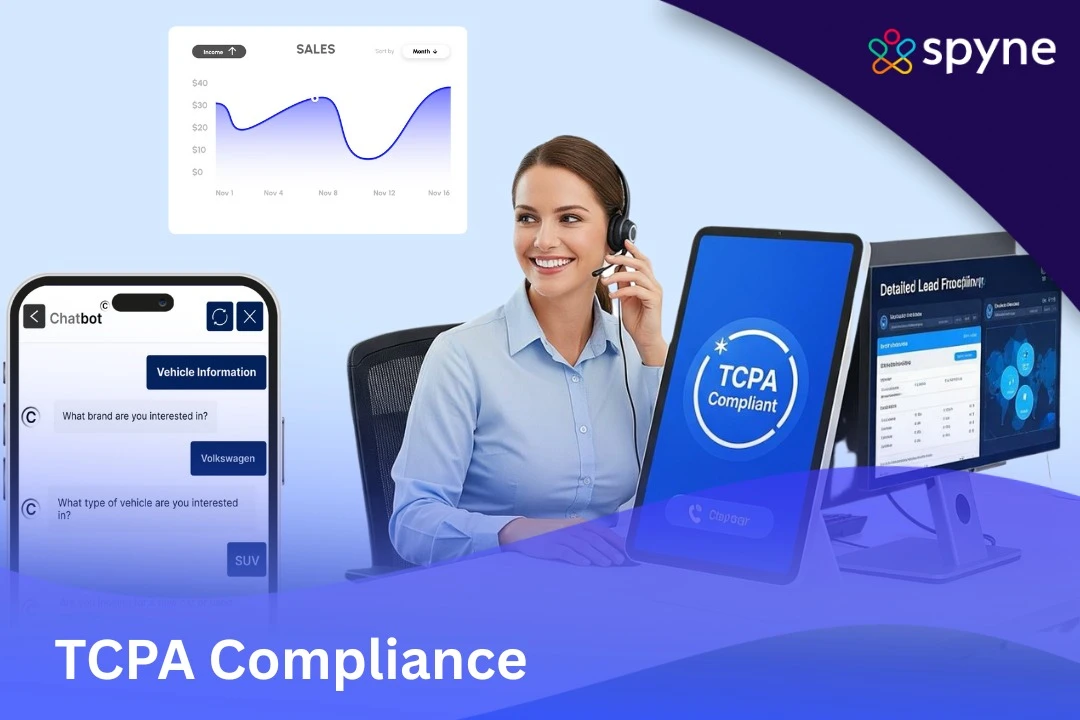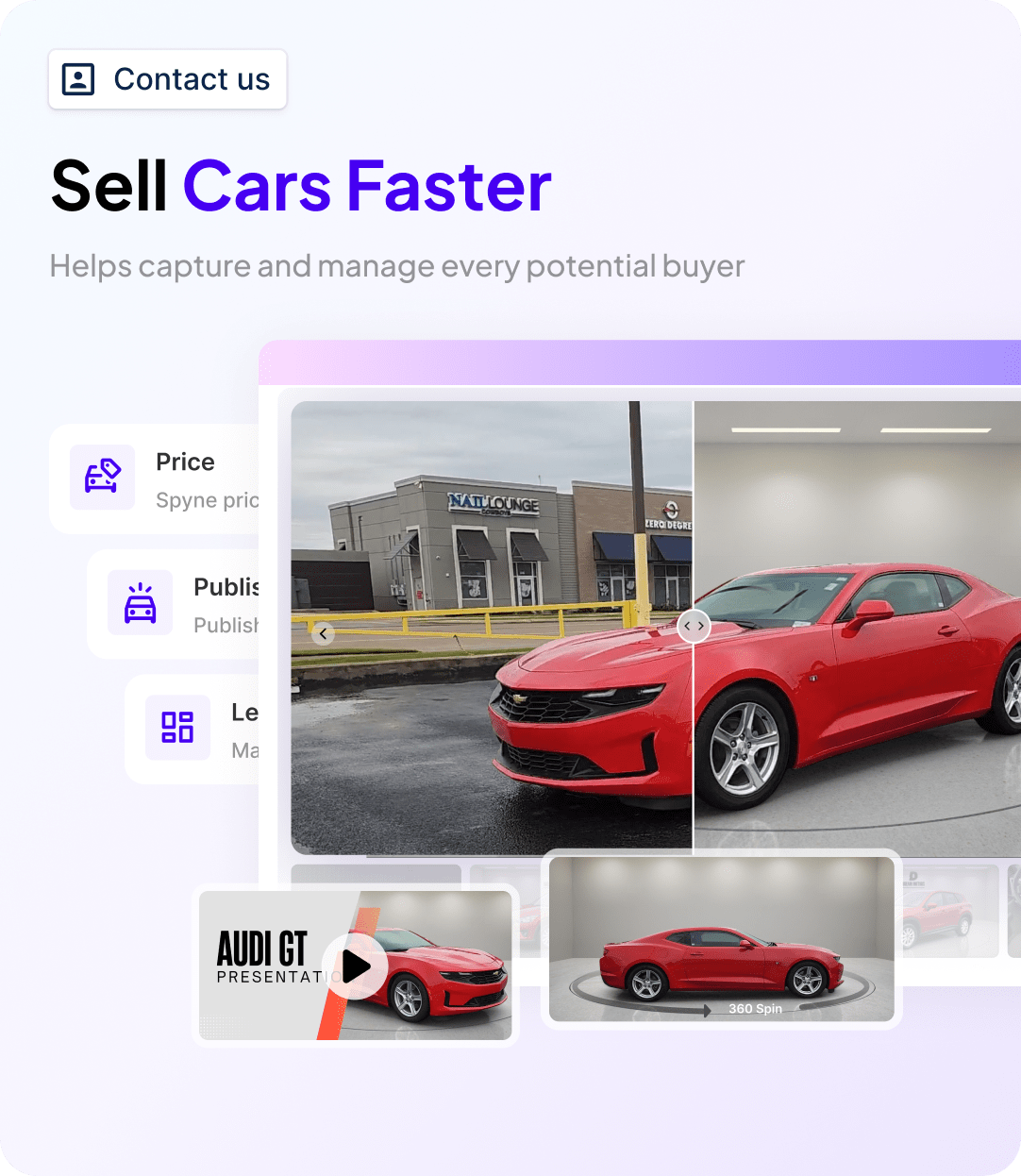The car buyers of today want quick answers, easy communication, and a smooth shopping experience, from browsing online to booking test drives. Most dealerships now use AI tools to handle calls, send updates, and respond to leads 24/7. This AI system helps them save time, reach more people, and boost sales. Many dealerships say AI gives them a real edge in a competitive market. But with great convenience comes responsibility. If your dealership sends texts or makes calls, following TCPA compliance is critical, or you could face lawsuits, fines, and a damaged reputation.
What is TCPA Compliance in the Automotive Industry?
TCPA compliance in the automotive industry means following the rules set by the Telephone Consumer Protection Act when contacting dealership customers by phone or text. Dealerships heavily rely on calls and text messages to talk to leads, book test drives, or follow up after a visit. But every time a dealership sends a message without getting permission from a potential customer, it could face legal trouble.
Today’s industry law requires clear written permission before making any marketing calls or sending promotional texts to customers. Additionally, if a dealership does not follow these rules, it can be fined $500 to $1,500 per call or text, even if it was a mistake. Some dealers skipped a few steps, which made them pay millions in lawsuits.
Over the years, TCPA regulations have led to a rise in lawsuits, especially against dealerships. Many law firms even target businesses with small errors in their calling or texting process. So, staying compliant isn’t just a legal requirement; it’s key to protecting your reputation and bottom line.
Why TCPA Compliance Is Critical for Auto Dealerships
TCPA compliance matters because it protects your dealership from legal trouble, builds customer trust in your dealership, and shows that you respect customers’ privacy. If you call or text customers without proper consent, even by accident, you could be fined between $500 and $1,500 per message. And in class action lawsuits, those fines can reach millions.
Today, many law firms actively look for dealerships that don’t follow TCPA rules. Even small mistakes can lead to major lawsuits. One wrong text to a customer without consent could cost you $1,500. Send that same message to 100 leads, and you’re suddenly facing $150,000 in penalties.
Beyond the money, non-compliance can also hurt your reputation. It can damage trust with your buyers, trigger bad reviews, and cause customers to walk away. On the flip side, following TCPA guidelines helps your brand appear more responsible and professional. It also creates peace of mind, so your team can market freely without the fear of legal consequences.
What is Considered Telemarketing?
In the context of TCPA compliance, telemarketing refers to any phone call or text message that promotes or tries to sell a product or service. It doesn’t matter whether it’s a real person or an automated system (like a robocall); if the message encourages the customer to take action that leads to a sale, it’s telemarketing.
For auto dealerships, telemarketing includes things like:
- Calling leads from a third-party list to offer vehicle deals
- Texting about upcoming sales or promotions
- Following up on test drives with a goal to sell
- Reaching out to past customers about trade-in opportunities
- Using call overflow solutions to manage high volumes of outbound promotional calls
However, not all communication is considered telemarketing. Informational messages are allowed without prior written consent. These include:
- Service appointment reminders
- Warranty or recall notifications
- Updates on paperwork or loan processing
The key difference is intent. If the goal is to inform, it’s not telemarketing. But if the goal is to sell even slightly, it falls under TCPA telemarketing rules and requires prior express written consent from the customer as part of maintaining proper TCPA compliance.
How TCPA Compliance Affects Your Dealership
TCPA compliance has a big impact on how dealerships connect with their potential customers. Most auto dealers use phone calls and texts to follow up with their leads, share offers, and schedule test drives. But these everyday actions come with risk. If a dealership sends even one message without proper consent, it could be violating TCPA regulations. That’s why many now rely on tools like contact management software for car dealerships to organize leads, track permissions, and reduce compliance errors.
Fines for non-compliance range from $500 to $1,500 per call or text. Now think about how many texts your team sends during a sales event; those numbers add up fast. Even unintentional mistakes by your sales team can turn into expensive lawsuits for your dealerships.
Beyond money, there’s also the damage to your dealership’s reputation. A single TCPA text message violation can lead to online backlash, loss of customer trust, and even bad press. That’s why it’s not just about avoiding fines, it’s more about protecting your brand image in the marketplace and doing business the right way.
What Your Dealership Needs to Know About TCPA Compliance
If you’re running a dealership, you probably make a lot of calls and send texts to connect with leads. But to follow TCPA compliance, there are a few important rules you need to know. These rules protect customers from unwanted messages and protect your business from legal trouble.
1. Understanding Auto-Dialers and ATDS
Some dealerships use systems that dial numbers or send texts automatically. These are called Auto-Dialers or ATDS. In 2021, the Supreme Court said that these systems only count as ATDS if they create numbers randomly or in order. So, if your system uses saved contact lists, you’re likely safe under federal law. But be careful, some states have stricter rules. Using automotive call monitoring software alongside these systems can help ensure that all calls follow the appropriate regulations and maintain a record in case of audits.
2. Do Not Call Rules Still Apply
Even if your message is legal under federal law, you can still get in trouble if you call or text someone on the Do Not Call (DNC) list. You’re only allowed to contact them if:
- They asked about your services in the last 90 days, or
- They made a purchase in the last 18 months
Many dealerships forget to track this. That’s how small mistakes turn into big fines.
3. Watch Out for AI Tools and Voicemails
If you’re using pre-recorded voice messages, ringless voicemails, or AI phone tools, you need written permission from the customer first. A recorded “yes” on a call doesn’t count. That’s the law now after a case called Bradley vs. DentalPlans. This also applies if your business uses automotive call center outsourcing that contacts customers on your behalf; they must follow the same consent rules to avoid violations.

4. Always Scrub Your Contact List
Before you call or text anyone for marketing, you must remove people from the Do Not Call list. This rule applies no matter what kind of phone you use, even if it’s just your personal mobile.
5. Text Messages Count Too
Texting a customer without consent can get you into the same trouble as phone calls. Many dealerships use texting tools, but not all of them are built for TCPA SMS compliance. If you’re using an automated text messaging service for car dealerships, make sure it follows the latest TCPA rules and always secures proper consent before sending any marketing messages.
6. New Rules for Getting Consent
Recently, the FCC updated the rules for consent. Now, consent must:
- Be given directly to your dealership
- Be specific about the car or service you’re offering
- Not come from random websites or partner platforms
So, if you’re getting leads from other sources, make sure they’re collecting consent the right way.
7. How to Stay Safe
To follow the law and avoid trouble:
- Check your calling and texting process regularly
- Make sure you have a proper written consent
- Keep your DNC list updated
- Stop contacting anyone who opts out
- Stay updated with the new TCPA rules
- Provide regular automotive phone training to your sales and support teams so they understand what’s allowed and what’s not
How Spyne Helps Your Dealership Stay TCPA Compliance Ready
At Spyne, we understand the pressure that comes with staying on top of TCPA compliance, especially when you’re juggling sales targets, leads, and follow-ups. That’s why we built a conversational AI solution that helps dealerships like yours connect with customers, without risking fines or damaging trust.
1. 24/7 Follow-Ups Without Violating TCPA Rules
Leads don’t wait, and neither does Spyne. Our AI follows up with customers day and night, but only when it’s allowed. As an automated lead follow-up system for car dealerships, every message is sent at the right time, with the right consent, so your dealership never crosses the line. You get more replies, more appointments, and full compliance.
2. Human-Like Conversations That Build Trust
Spyne’s AI voice agents and chat tools speak in a natural, polite tone just like your best sales rep would. This makes conversations feel personal, not pushy, which keeps customers engaged and comfortable. Plus, it helps avoid language that may trigger complaints or opt-outs.
3. Lead Scoring and Smart Analytics
Not every lead is ready to buy. Spyne’s system uses smart analytics and AI lead scoring for car dealerships to tell you which contacts are worth your time. You’ll know who to call when to text, and how to follow up while still respecting TCPA guidelines.
4. Call Tracking and Conversation Summaries
Every call and message is logged. Our platform creates detailed summaries of conversations and tracks who said what, and when. This gives your team full visibility and protects you if any complaint comes up. It’s a powerful way to stay safe and organized.
5. Omnichannel Engagement, One Set of Rules
Whether it’s calls, texts, emails, or chats, Spyne handles everything in one place. And every interaction follows TCPA rules. No matter how your customer responds, we track consent and opt-outs across all channels so nothing gets missed.
6. Seamless CRM Integration
Spyne connects with your CRM so that lead info, follow-ups, and opt-out statuses stay up-to-date. With powerful automotive CRM integrations, your team can avoid double texting or calling someone who already said “no,” and stay aligned with auto dealer compliance laws.
Conclusion
Staying compliant with TCPA compliance regulations isn’t just about avoiding fines—it’s about protecting your dealership’s reputation and building long-term trust with your customers. Spyne helps you do exactly that. With our AI-powered communication tools, you can connect with leads 24/7, manage follow-ups, handle opt-outs, and track every call and message, all while staying fully TCPA compliant. Whether it’s through smart lead scoring, human-like conversations, or seamless CRM integration, Spyne makes it easy to grow your business without breaking the rules. Book a free demo today and see how Spyne can help your dealership stay safe, efficient, and ahead of the game.
















